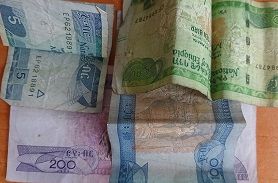By Anwar Hussen Mohammed – Ethiopia’s economic boom of the past decade has hit a snag – a foreign exchange (forex) shortage. This lack of readily available foreign currency hinders businesses, slows growth, and creates a complex situation for the Ethiopian government.
The Ethiopian Birr (ETB) is currently worth around 0.017 US dollars (USD). This means it takes roughly 57 Birr to equal 1 US dollar. You can find this exchange rate on various currency converter websites. While the the value of 1 US dollar in black-market is between 116 to 120 Birr. The gap between the two markets ahs been widening mainly because of the shortage of foreign in the formal market.
Understanding the Shortage
Several factors contribute to Ethiopia’s forex woes. Weak export performance is a key culprit. While the country boasts a large agricultural sector, its exports are limited. Meanwhile, the demand for foreign currency is high, fueled by imports of essential goods like medicine and manufacturing inputs. This imbalance between inflows and outflows strains the forex reserves.
The Impact
The shortage creates a ripple effect. Businesses struggle to secure forex to import necessary supplies, hindering production and expansion. This can lead to product shortages and price hikes for consumers. Additionally, foreign investors may be wary of entering a market with limited forex availability.
Government Measures
The Ethiopian government has taken steps to address the crisis. These include:
• Cracking down on the black market: By freezing suspicious accounts and banning non-essential imports, the government aims to curb illegal forex activities and channel resources into official channels.
• Boosting exports: Initiatives to improve export performance by diversifying products and streamlining procedures are underway.
• Liberalization: Gradual reforms aim to attract foreign investment by easing regulations and opening the financial sector to private players. This could bring in much-needed foreign currency.
Pathways to a Solution
While these measures offer some relief, a sustainable solution requires a multi-pronged approach:
• Export diversification: Ethiopia needs to move beyond traditional exports and develop new markets for its goods and services.
• Import substitution: Encouraging domestic production of essential goods can reduce reliance on imports and ease the forex burden.
• Diaspora engagement: The Ethiopian diaspora represents a significant source of investment and foreign currency. Policies that incentivize their participation can be beneficial.
• Exchange rate flexibility: A more flexible exchange rate system could help adjust to market forces and attract foreign currency inflows.
Currency devaluation can be a tool to address foreign currency shortage in Ethiopia, but it’s a double-edged sword. Here’s why:
Potential benefits:
• Makes exports cheaper: A weaker Ethiopian Birr makes Ethiopian goods cheaper for foreign buyers, potentially boosting exports and bringing in more foreign currency.
Potential drawbacks:
• Increases import costs: Imports become more expensive, which can lead to inflation as businesses pass on the higher costs to consumers. This can hurt Ethiopians who rely on imported goods.
• Discourages investment: A declining currency can make Ethiopia a less attractive destination for foreign investors, further limiting foreign currency inflow.
• Black market thrives: A big gap between the official and black market exchange rates can incentivize people to use the black market, undermining government control over the economy.
Alternatives to devaluation:
Ethiopia’s central bank has tried other methods to manage the shortage, like:
• Regulations: Limiting how much foreign currency people can take abroad.
• Franco-Valuta: Allowing import of essentials without using official channels.
Overall:
Devaluation is a complex issue with both advantages and disadvantages. While it might help with exports, it can also worsen inflation and discourage investment. Ethiopia’s government needs to weigh these factors carefully before deciding on devaluation. But most of all modernizing the financial sector, opening the financial sector for foreign players like neighboring countries and allowing Forex Exchange Bureaus to flourish can be considered as a lasting solution for the chronic forex shortage Ethiopia has been experiencing for the past several decades.
In general, overcoming the forex shortage requires a long-term vision and commitment from both the government and the private sector. By focusing on boosting exports, promoting domestic production, and creating a more attractive investment climate, Ethiopia can navigate this challenge and ensure sustainable economic growth.

